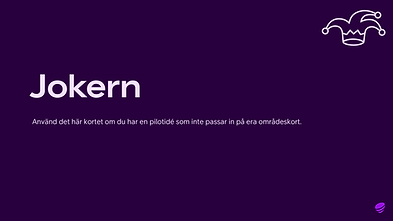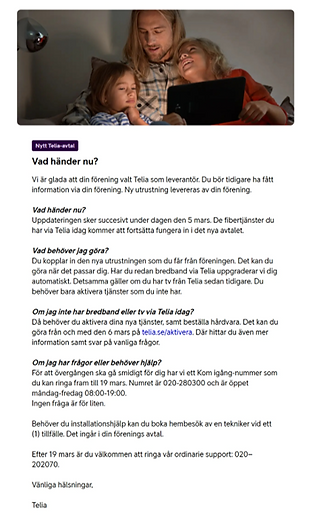Apollo 18.oct 2024 - nov 2025
Background
Apollo 18 is the largest project I have initiated. At its peak, the project involved a multidisciplinary team with participants from six different teams and three business units. The purpose was to develop a more proactive customer experience for collective customers through a pilot-driven approach.
Onboarding for collective collective customers was selected as the focus area based on customer insights and available resources. The goal was to create solutions that make it easier for customers to get started with their services, thereby reducing friction and the need for support.
Results
Over 2,000 customers participated in three pilots. We analyzed 163 customer service calls, conducted 10 in-depth interviews, and distributed more than 1,600 surveys.
Apollo 18 resulted in new recommendations for proactive customer experience practices within Telia. Among other outcomes, we developed an improved model for data aggregation and monitoring, introducing new thresholds with higher precision. We delivered several tangible improvements to the onboarding process. In addition, we provided guidelines for planning, evaluating, and implementing pilot-driven methods across the organization.
Thematic Analysis
Apollo 18 was firmly rooted in customer feedback and insight-driven decision-making from the very beginning.
During the initial phase, we conducted an extensive thematic analysis of over 3,000 NPS comments to identify recurring pain points in the customer experience. The analysis was carried out in Miro, where comments were exported as virtual sticky notes and organized into clusters based on content and theme.
Using thematic analysis at this stage proved highly valuable, as the visual format made it easy for stakeholders to grasp the scope of the identified pain points. These insights formed the foundation for the pilots that were later developed and tested within the project.
The thematic analysis of NPS data revealed clear patterns and valuable insights. Although reading, categorizing, and clustering all 3,000 comments took considerably more time than I might like to admit.

Thematic analysis with over 3,000 NPS comments
Workshops
In addition to the thematic analysis, I facilitated two workshops with participants from different parts of the organization. Stakeholders were identified through a mapping process based on their roles and expertise. The purpose was to co-create new concepts that could be tested at pilot scale and leverage the collective knowledge of the multidisciplinary team.
The process resulted in six initial concepts, which were narrowed down to three during a follow-up workshop. These concepts were iterated and refined before being implemented and tested with real customers, ensuring that the solutions were both practical and firmly grounded in customer insights.
Facilitating workshops in multidisciplinary teams is always challenging but also highly rewarding.


Two game cards used during Workshop #1
Pilots
To enable rapid and iterative testing of new concepts, the project was designed to be pilot-driven from the start. To execute the pilots as efficiently as possible, we developed a dedicated project structure consisting of a Mission Control team with expertise in project management, analytics, service design, marketing automation, customer insights, product management, and business development. Each pilot also had a dedicated Pilot Lead responsible for practical implementation.
In total, three separate pilots were conducted, each testing one of the concepts developed during the earlier workshops. Every pilot started on a small scale and was followed by an iterative analysis and feedback loop, allowing us to adjust direction and ensure we gathered the necessary data before scaling up.
Pilot 1
Focused on making it easier for customers to book a technician when ordering services. We tested a solution where collective customers could book a technician online and received clearer communication about the support offered.
Goal: Simplify technician booking and reduce calls to customer service.
Pilot 2
Aimed to help customers who had not activated their services through proactive communication. We sent onboarding guides, information about the Mitt Telia app, and support contact details at specific points in the customer journey.
Goal: Reduce customer service calls, increase service activation, and boost app usage.
Pilot 3
Focused on renegotiations where customers receive new hardware. We offered a prioritized customer service number with fast-track access, additional contract information, and the option to book a technician for the entire housing association.
Goal: Faster assistance, correct installation, and an improved experience during renegotiations.

Concept mail used in pilot #3
Learnings & Reflections
Apollo 18 was an intense and inspiring project with a scope that I initially found challenging to grasp. It truly highlighted the complexities of working cross-functionally in a large organization, where numerous roles and decisions need to be aligned.
At the same time, it was one of the most educational projects I’ve participated in, thanks to the high level of expertise within the team and the insights that emerged in every interaction. Two out of three pilots were completed as planned, while the third had to be terminated early due to external factors an experience that itself became a valuable lesson in navigating complex project environments.